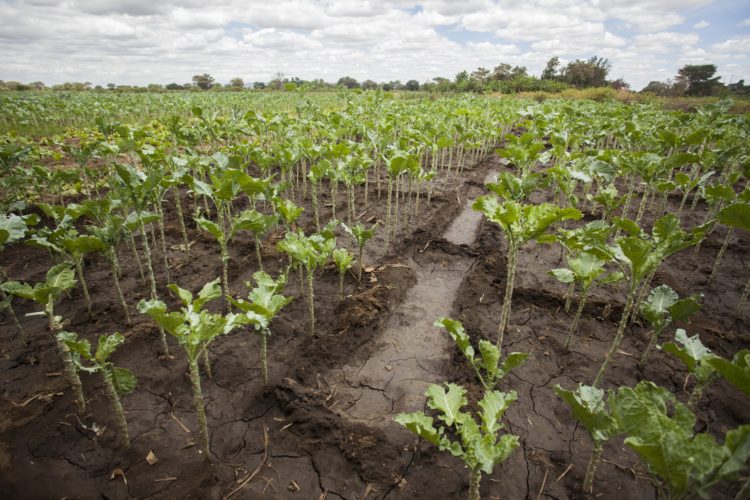For the 2022-2023 agricultural campaign, several farmers in West Africa say they are facing a real problem of access to fertilizers. With the increase in fertilizer prices on the world market and the reduction in available stocks, it is difficult for these farmers to buy the quantity of fertilizer they need. An advocacy organization for farmers, the Togolese Coordination of Peasant Organizations and Agricultural Producers (CTOP) is well aware of these challenges.
From May 18-20, 2022, CTOP joined Farm Radio International (FRI) Radio Partners Network WhatsApp group to discuss this situation and the role of radio stations in bringing the right information about fertilizer to agriculture.
Kodzo Elom ZOGAN, Executive Secretary of the CTOP returned to the advocacy efforts of his Organization with the authorities, to ensure easy and inexpensive access to fertilizers for farmers. The head of the CTOP Executive Secretariat indicated that there wasa 44% increase in the price of food fertilizers (NPK and Urea), an increase that reached 18,000 FCFA, this compared to the campaign. past.
The Ministry of Agriculture, Livestock and Rural Development (MAEDR) has announced the mobilization of 76,000 tons of fertilizer, but access is conditioned by the enrollment of producers and the validation of the list at cantonal, prefectural, regional and national. It should be noted that the prices of cotton fertilizers remain unchanged compared to the past crop year. The Executive Secretary of the CTOP indicated that many producers are concerned about this situation. Remember that fertilizer prices depend mainly on government subsidies.
Kodzo Elom ZOGAN also indicated that his Organization is in contact with the government, in particular the MAEDR, in order to discuss the situation andits impact on food security. This approach aims to find a quick and effective solution to support farmers. He also insisted on the urgency of accelerating the agro-ecological transition of agricultural production systems in Togo.
Broadcasters know well the challenges of their audience, which is made up primarily of farmers.
Abdoulaye Kammessiegou of Radio Courtoisie explains these challenges in these terms: “Here in the Savanes region, the increase in the price of fertilizers is almost on everyone’s lips since the majority of the population is peasant. It is difficult for farmers to accept this increase in the price of fertilizers in the current living conditions. Some feel that a change of culture is necessary to deal with this new situation. Maize, which is mainly grown in the region, is likely to lose its place to other crops that require less fertilizer, notably millet, sorghum,etc.» He continues in the same direction by declaring: “Access is not the only challenge. A few farmers ask questions about the effectiveness of fertilizers.
A broadcaster from the prefecture of Doufelgou wondered about the situation: “Should we not pay attention to the quality of the fertilizer made available to producers today? The last agricultural season left a bitter observation in the prefecture of Doufelgou, precisely in the Canton of Siou where the producers unfortunately saw their yield drop following the use of the fertilizer made available to them. Isn’t it necessary to control the quality of imported chemical fertilizers?
Several broadcasters have suggested the use of compost and manure instead of chemical fertilizers. For his part, Bidé Boyodi Yawou of Radio La Paix broadcasting from the plateau region said: “The perspective for farmers is to fall back on composting. We can initiate a project for the popularization of compost. I know that before the appearance of chemical fertilizers, at home in Kabyè country, the producers only used manure and compost, and it was successful despite the arid soils of the Kara region.
With radio programs focusing on agroecological approaches and the use of manure and compost, Mawuli Affognon, FRI’s Networking Officer for Togo shared several radio scripts and news from Barza Wire, the agricultural news service of FRI, regarding these topics. For example, this radio script in the form of a drama about organic fertilizer that farmers can make themselves. Also this Barza Wire story from Senegal on organic fertilizer used for growing cotton, peanuts, cassava, and sorghum.
The radios also offered different radio formats to better develop this subject on the air. The use of vox pops and other interactive approaches have been suggested to capture farmers’ opinions. The latter have many questions and also have their own opinions regarding the situation of access to fertilizer. And surely farmers have ideas about the emergence of alternatives to chemical fertilizers or the consequences of the fertilizer shortage on the progress of the 2022-2023 agricultural campaign. The radio programs will amplify these ideas, and help support farmers to achieve improved yields this crop year.
Photo: Crops in Valeska village near Arusha, Tanzania on October 7, 2013.


Comments are closed, but trackbacks and pingbacks are open.